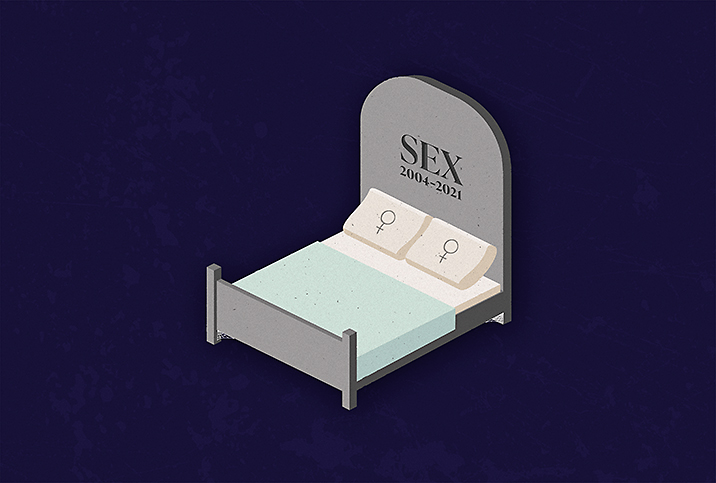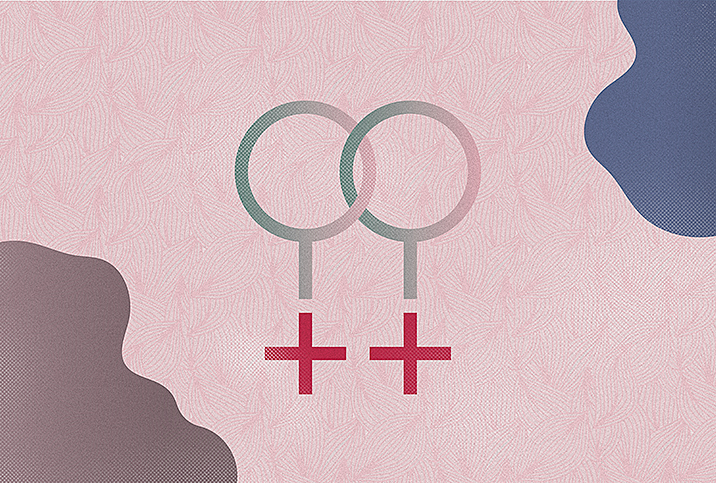Is Lesbian Bed Death Actually a Thing?

Yes, we move in together on the second date. We drive Subarus. We know way too much about astrology. Some lesbian stereotypes may be rooted in a bit of truth, but what about lesbian bed death? Is it an offensive myth or is it a real problem disrupting sex lives around the world?
"Lesbian bed death," or LBD, is the idea that when two women are in a relationship together for a long time, they stop having sex. But, of course, this isn't unique to women who love women. It's a stereotype of any marriage or long-term partnership that the amount and quality of sexy time decreases as people age and get into monotonous routines.
Any relationship can experience a decline in sexual desire. "It's more person-specific than gender-specific," explained Jeanae Hopgood, Ph.D.(c), a couples and family therapist in Plymouth Meeting, Pennsylvania. "Partners who have been together for a significant amount of time often report a decrease in the frequency of sexual activity. It is definitely a real issue that sparks genuine feelings of concern for the longevity of some of these relationships."
The concept of a waning sex life being specific to sapphic women (women who love women) goes back to the 1983 book "American Couples: Work, Money, Sex," by Pepper Schwartz and Philip Blumstein. The authors made assumptions based on their bias and on very little data. They validated the problematic idea that without a man, women wouldn't initiate sex. They said their research (a small sample size) showed that lesbians had less and less sex at every stage of their relationship.
'Partners who have been together for a significant amount of time often report a decrease in the frequency of sexual activity.'
Now, any book published in 1983 is going to present a very different view of LGBTQIA+ identities than one published today, even if it were written by queer people (and "American Couples" decidedly was not). And any small amount of data collected almost 40 years ago doesn't prove a trend without modern and larger studies to prove its theories. Surveys too often ask about how often penetration occurs as the definition of sex, totally missing plenty of great lesbian sex by asking heterocentric questions.
Studies are slim on the topic. However, one Dutch study from 2008 found that "bed death," defined as "a quasi-complete cessation of sexual activity," was an issue for 23 of 30 self-identified lesbian women.
Hopgood said the cases of LBD she's seen are caused by reasons you might expect: being too busy for each other, getting complacent, and getting bored. "Your partner isn't 'new' anymore," Hopgood explained. "They know the places to touch, the preferred positions, the ways to get their partner to orgasm, etc. Because partners feel like they know all these things, they default to those practices, making sex feel routine and even boring at times." Another issue is feeling very comfortable with each other, which can be "wonderful and safe, but sometimes isn't very sexy. Many of the things they did/efforts made earlier in the relationship are abandoned."
Certified sex therapist Laurie Watson, Ph.D., LMFT, said couples can get caught up in a push-pull cycle. "Sexually, one woman says, 'You pressure me and then I don't want it!' The more the first woman pushes, the more the other pulls away," she said. "It's dynamic. Pursue-withdraw."
'Don't panic, don't make assumptions—have the conversations needed about how you've gotten to this point, and how to move forward together.'
To break this cycle, Watson recommends that each partner recognize their contribution to the pressure to have sex "and learn how to honor the protective strategy of the other—not as something done to hurt them, but as a way their body has taught them to react to danger." The one withdrawing might say, for example, "You push and get angry because you really want change between us…While your anger kinda frightens me—I believe you have good intentions to make us more intimate." The pursuer could say, "You keep saying, 'We'll talk about it later.' Even though I feel a little abandoned when you say that, I know you want to keep things calm between us and give us the best chance at problem-solving. How about Saturday a.m. over coffee?"
Hopgood's number-one piece of advice on how to deal with lesbian bed death is not to panic. "View it (not your partner) as a problem that can be solved, and work together to address what's happening," she said. "If you panic, you become reactive rather than responsive, and that doesn't usually lead down favorable roads. Don't panic, don't make assumptions—have the conversations needed about how you've gotten to this point, and how to move forward together."
As with all relationships, a sexless one requires communication. Long-term partners—queer or not—looking to get things hot again will have to work on libido and resurrecting desire in the bedroom. And it's not impossible. Opening a dialogue and being patient will prevent your relationship from going into the bedroom to die.


















